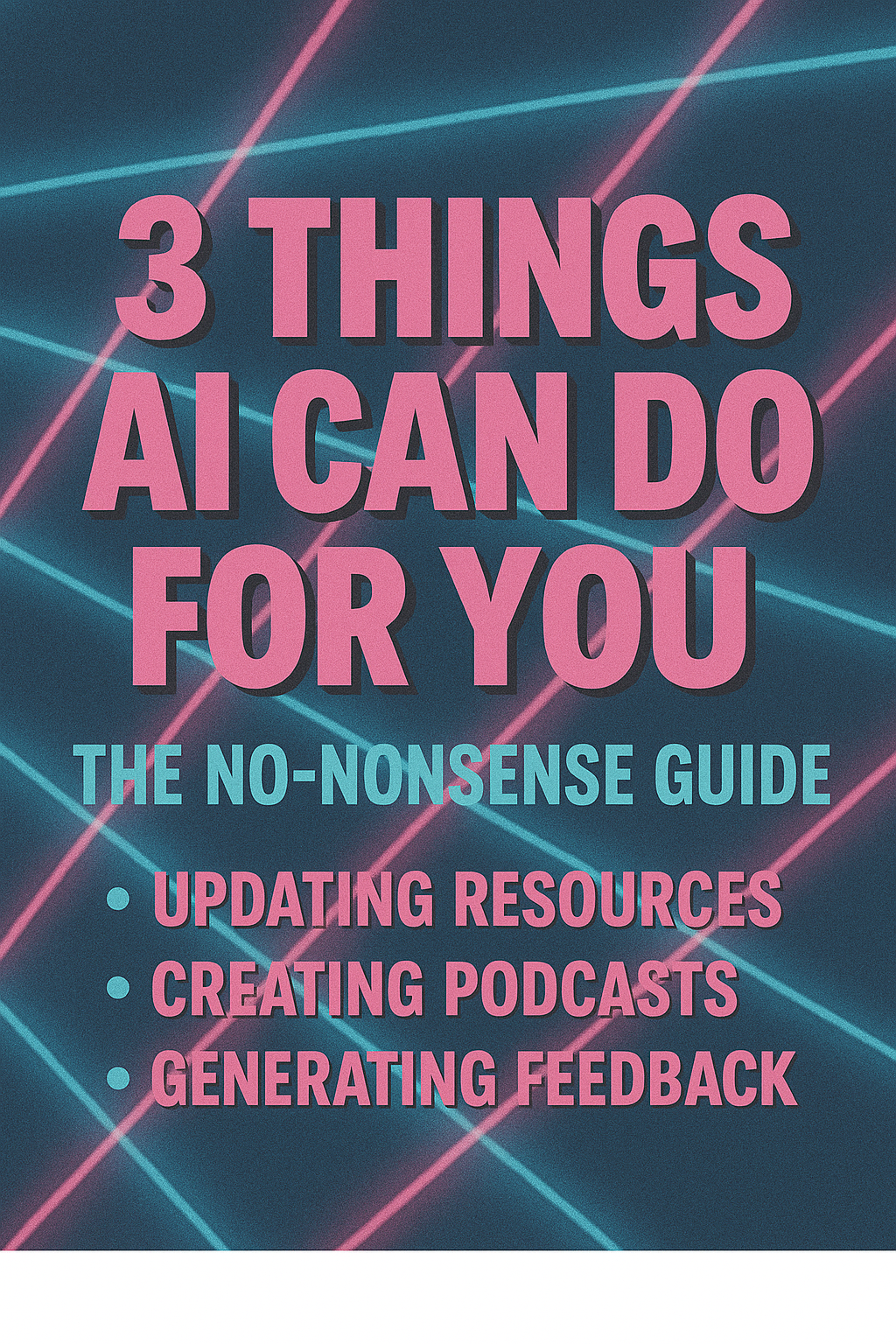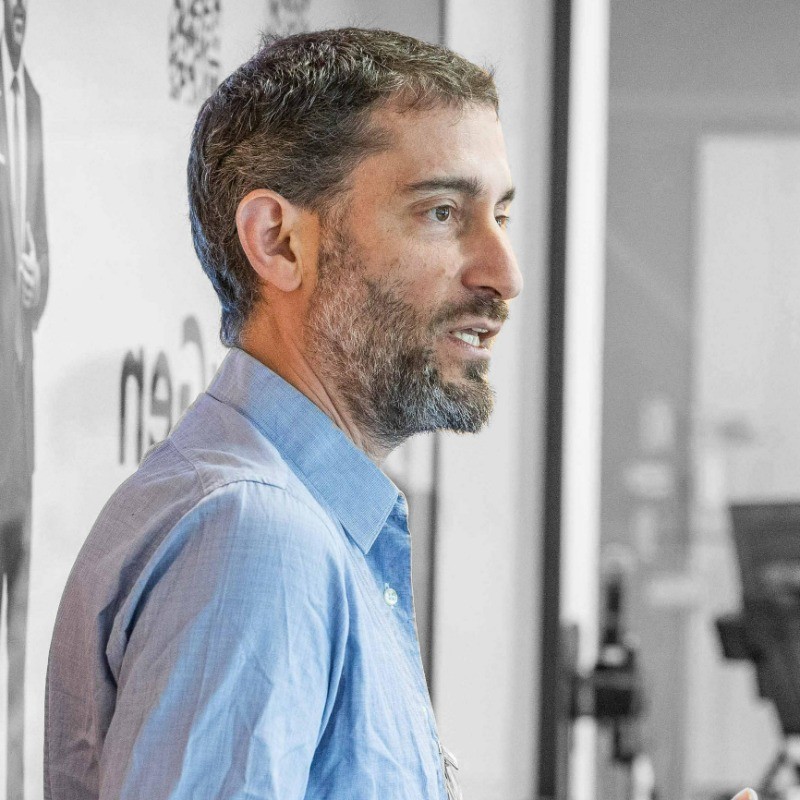by Dr Yannis
Estimated reading time: 6 minutesSome people are for it, some people are against it, some people write guidelines about it. What unites most of these ‘factions’ is an almost total inability to use it effectively. Yes, I am talking about AI, the super useful, super intuitive thing that is changing your life by, well, generating some misspelled logos.
This blog post offers something different. Three real things you can do. I will tell you what they are, how to do them, why you should do them, and how much it will cost you. And I am not talking about the things everyone else is talking about.
I know about all this, because ever since ChatGPT launched late 2022, I have been all over it. I have incorporated AI tools into all aspects of my work (even life) and I have built an entire business on the back of it. Here we go then.

Thing Number 1: Updating Your Resources
Academics spend a great deal of time updating things. We update reading lists, handbooks, lecture notes, guides, textbooks, all of the time. Sometimes, we update material in areas we have deep expertise, sometimes we update a handbook in a module that got dumped on us because someone left.
Here is how to leverage technology to make this process faster and less painful. You will need a subscription to ChatGPT (£20+VAT, prices as of September 2025) and access to Gemini (via Google Pro subscription, currently free for a year for students and staff or £18.99/month).
Upload the material you wish to update, for example a chapter from a textbook. You select the deep thinking or research option and ask the bot to conduct a review for updates and recommend changes to your uploaded text. Once this is ready, ask it to incorporate the changes into your text, or input them manually as needed. You then take the updated document and run it through the other model, asking it to check for accuracy.
The result is an updated document, which has been updated, verified and often reworded for clarity. Both models offer references and explain their rationale, so you can verify manually and check every step of the process.
Conclusion? You have updated your resource, and it took you one morning, instead of a week
Thing Number 2: Creating Podcasts
Yes, we can lecture, we can offer tutorials, indeed we can upload pdfs on the VLE. But why stop there? Students benefit from multi-modal forms of learning. The surest way to get the message across is to deliver the same information live, via text, audio and video, multiple times.
What has been stopping us doing this effectively? The answer is that most of us are terrible in front of a camera. Yes, students may appreciate a video podcast, but if you look like the hostage in a ransom request video, you are unlikely to hold their attention.
Here is what to do. Use one of the bots you already subscribe to, ChatGPT, or Gemini (as above) or even copilot (via an institutional licence or £19/month) to turn your lecture notes, book chapter or even recordings of live sessions into a podcast script. You can select length, style, and focus to match your intended audience.
You then go to ElevenLabs ($22+VAT/month) and make a clone of your voice. This sounds scary, but it isn’t. Just one tip, do not believe the ‘5 minutes of recording and you’ll fool your mom’ spiel. You need to find quality recordings of your voice that run for a couple of hours for good, reliable results.
Once you have your voice clone, go to HeyGen ($29+VAT/month) and create your video clone. This can be done (at high spec) by either uploading a green screen recording of yourself of about 20’ or by using a new photo-to-video feature (I know this sounds unlikely, but it works very well).
You are now good to go, having cloned yourself in audio and video. You can bring the two together in HeyGen, feed it your pre-prepared scripts and bingo, you can produce unlimited videos where you narrate your lecture scripts looking like a Hollywood star, and no one needs to expect a ransom note.
Thing Number 3: Generating Student Feedback
Most of us are used to generate student feedback on the basis of proformas and templates that combine expectations on learning outcomes with marking grids and assessment criteria.
What students crave (and keep telling us in surveys such as the NSS in the UK), is personalised feedback. Hardly anyone has the time however to personalise templates to student scripts in a way that is deeply meaningful and helpful. We usually copy-paste the proforma, and stick a line extra with an invitation to ‘come and see me if you have questions’.
The bots described above (ChatGPT, Gemini, Copilot etc) do a fantastic job of adapting templates to individualised student scripts. Yes, this requires you uploading a great deal of university resource and the student scripts to the bot, so more on this below.
And Now The Small-Print
First of all, we’ve racked up quite a bill here. You must be thinking, why should I pay for all this out of my own pocket? The answer is you should not, but even if you did, it won’t be that bad. You don’t need to keep paying the subscriptions post the point you need them (all these are PAYG) and most offer free trials or discounts at the beginning of your subscription. You may even get your university to pay for some of it (for example copilot).
Secondly, aren’t there data protection and privacy concerns? Yes there are. All of the above assumes you either own the resources you are uploading, or you have permission to do so. This is a tall order for most institutions that have an unnecessarily guarded view of AI. Some concern is real. For example, I don’t like the latest iteration of Gemini’s terms which forces third party reviewers onto your content if you want full functionality.
Thirdly, won’t a kid in Texas go without a shower, every time you say thank you to ChatGPT? I choose not to care about the latter. The Americans have bigger fish to fry at the moment.
Here you have it therefore, 3 concrete things you can do, as an academic with AI, with costs explained. Bonus feature? You can use all these tools to launch your own school on social media, like I did!

Dr Ioannis Glinavos
Academic Entrepreneur
Dr Ioannis Glinavos is a legal academic and education innovator with a strong focus on the intersection of AI and EdTech. As a pioneer in integrating artificial intelligence tools into higher education, he has developed engaging, student-centred resources—particularly in law—through podcasts, video content, and interactive platforms. His work explores how emerging technologies can enhance learning outcomes and critical thinking, while keeping students engaged in synchronous and asynchronous content.
Software / Services Used
| ChatGPT | https://chatgpt.com/ |
| Google Gemini | https://gemini.google.com/app |
| ElevenLabs (AI Voice Generator) | https://elevenlabs.io/ |
| HeyGen (AI Video Generator) | https://www.heygen.com/ |

